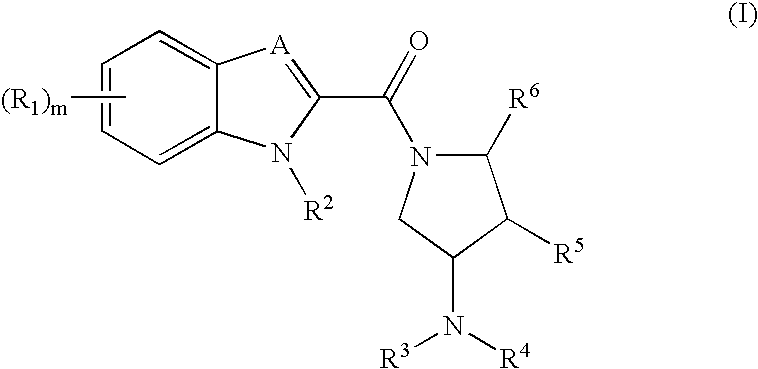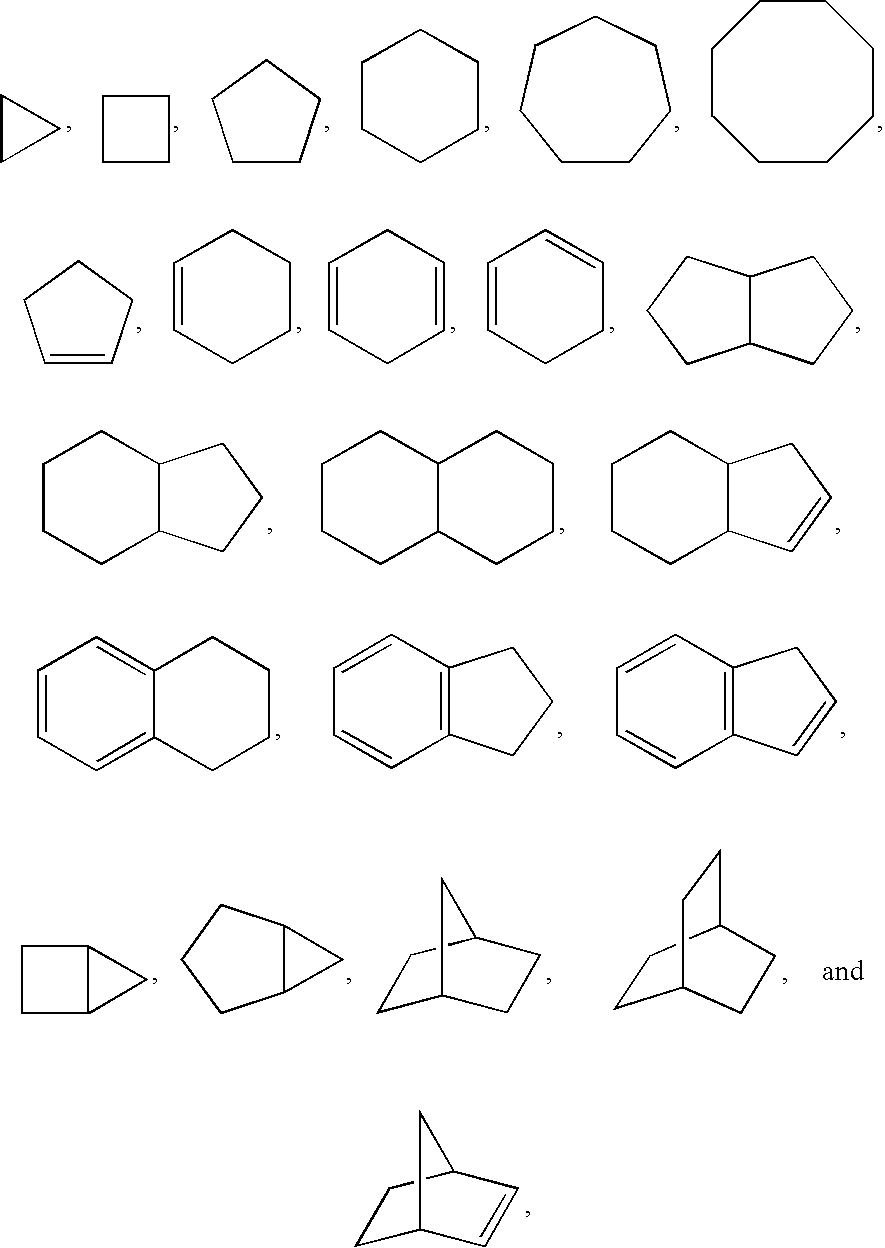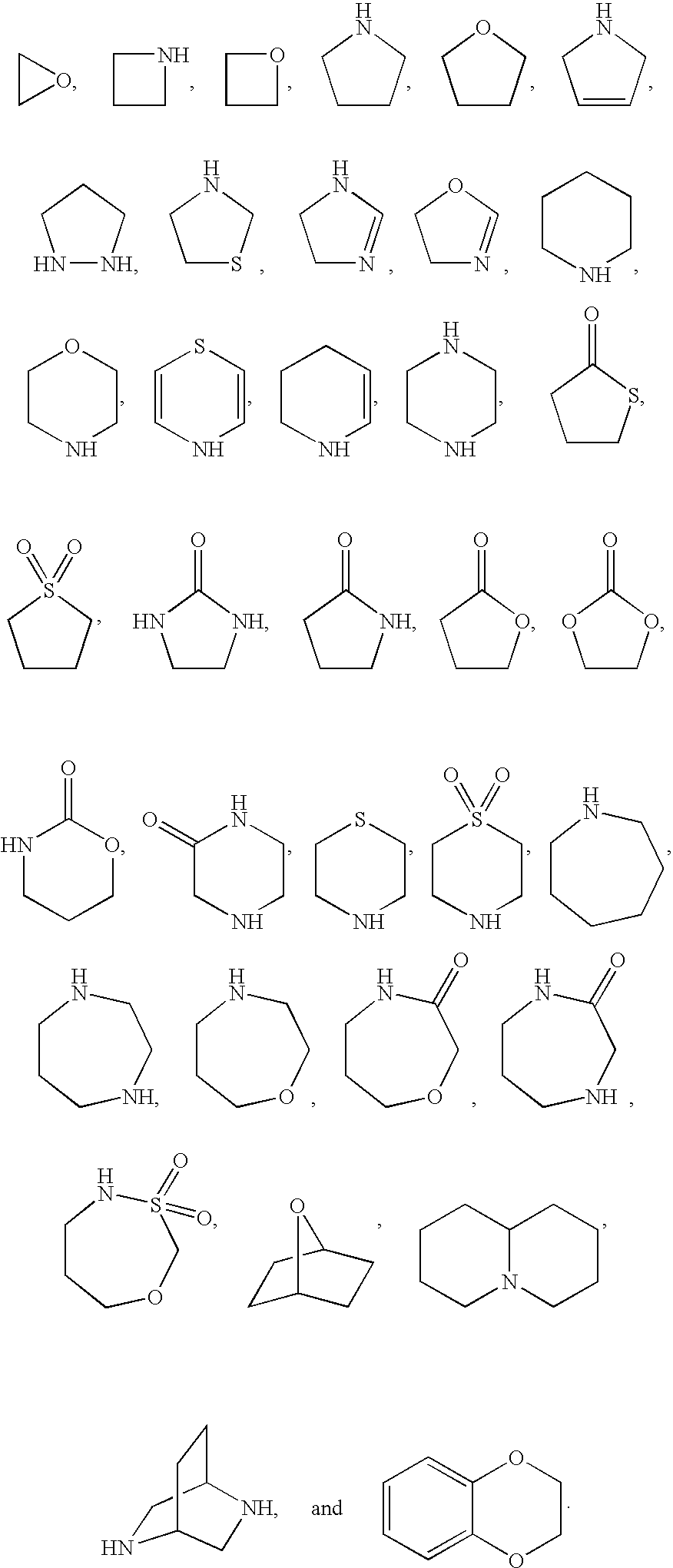Indoles and benzoimidazoles as histamine H4 receptor modulators
a technology of histamine h4 receptor and indole, which is applied in the field of indole and benzoimidazole compounds, can solve the problems that the>1 /sub>receptor antagonists are not completely effective in the clinic, and achieve the effect of modulating the activity of the histamine h4 receptor
- Summary
- Abstract
- Description
- Claims
- Application Information
AI Technical Summary
Benefits of technology
Problems solved by technology
Method used
Image
Examples
example 1
(S,S)-(2,5-Diaza-bicyclo[2.2.1]hept-2-yl)-(1H-indol-2-yl)-methanone hydrochloride salt
[0097]
[0098]Step A: 1H-Indole-2-carbonyl chloride. To a suspension of indole-2-carboxylic acid (800 mg, 4.9 mmol) in CH2Cl2 was added oxalyl chloride (1.28 mL, 14.9 mmol) and N,N-dimethylformamide (DMF; 0.05 mL). After 1.5 h at 40° C., the mixture was concentrated to give a yellow solid (874 mg, 98%), which was used without purification in subsequent reactions.
[0099]Step B: (S,S)-5-(1H-Indole-2-carbonyl)-2,5-diaza-bicyclo[2.2.1]heptane-2-carboxylic acid tert-butyl ester. To a 0° C. suspension of indole-2-carbonyl chloride (100 mg, 0.56 mmol) in CH2Cl2 was added a solution of TEA (235 μL, 1.67 mmol) and (S,S)-2,5-diaza-bicyclo[2.2.1]heptane-2-carboxylic acid tert-butyl ester (156 mg, 0.84 mmol) in CH2Cl2. After 1.5 h at 0° C., the mixture was diluted with saturated aqueous (satd. aq.) NaHCO3 and extracted with CH2Cl2 (3×15 mL). The combined organic layers were washed with satd. aq. NaCl (20 mL), dri...
example 2
(S,S)-(1H-Indol-2-yl)-(5-methyl-2,5-diaza-bicyclo[2.2.1]hept-2-yl)-methanone
[0101]
[0102]To a solution of (S,S)-(2,5-diaza-bicyclo[2.2.1]hept-2-yl)-(1H-indol-2-yl)-methanone hydrochloride (50 mg, 0.18 mmol), TEA (50 μL, 0.36 mmol), and formaldehyde (6 μL, 0.22 mmol) in dichloroethane (DCE) / MeOH (10:1, 3 mL) was added NaB(OAc)3H (115 mg, 0.54 mmol). After 2 h at rt, the mixture was diluted with satd. aq. NaHCO3 and extracted with CH2Cl2 (3×). The combined organic layers were washed with satd aq. NaCl, dried (Na2SO4), and concentrated to yield an orange solid (44 mg, 96%). MS (ESI): mass calcd. for C15H17N3O, 255.14; m / z found, 256.4 [M+H]+. 1H NMR (mixture of rotamers; CDCl3): 10.34-10.08 (m, 1H), 7.64-7.54 (m, 1H), 7.44-7.35 (m, 1H), 7.24-7.16 (m, 1H), 7.09-7.00 (m, 1H), 6.80 (s, 0.5H), 6.67 (s, 0.5H), 4.99-4.86 (m, 1H), 4.05-3.95 (m, 0.7H), 3.84-3.77 (m, 0.3H), 3.71-3.62 (m, 1H), 3.55-3.46 (m, 1H), 3.18-3.10 (m, 0.3H), 2.98-2.88 (m, 0.7H), 2.82-2.69 (m, 1H), 2.46-2.31 (m, 3H), 1.98-...
example 3
(1H-Indol-2-yl)-(3-methylamino-pyrrolidin-1-yl)-methanone trifluoroacetic acid salt
[0103]
[0104]Step A: [1-(1H-Indole-2-carbonyl)-pyrrolidin-3-yl]-methyl-carbamic acid tert-butyl ester. To a solution of indole-2-carboxylic acid (388 mg, 2.40 mmol) and methyl-pyrrolidin-3-yl-carbamic acid tert-butyl ester (401 mg, 2.00 mmol) in THF (16 mL) was added CDI (356 mg, 2.20 mmol). After 18 h at rt, the mixture was concentrated, diluted with CH2Cl2, washed with satd. aq. Na2CO3 and water, dried (Na2SO4), and concentrated. The residue was purified by FCC to give the title compound (565 mg, 69%). MS (ESI): mass calcd. for C19H25N3O3, 343.19; m / z found, 344 [M+H]+. 1H NMR (CDCl3): 9.73 (s, 1H), 7.67 (d, J=8.0, 1H), 7.46 (dd, J=8.3, 0.8, 1H), 7.29 (t, J=8.2, 1H), 6.89 (d, J=1.3, 1H), 4.89 (br s, 1H), 4.26-3.49 (m, 4H), 2.85 (s, 3H), 2.36-1.96 (m, 2H), 1.76 (s, 1H), 1.49 (s, 9H). Anal. Calcd for C19H25N3O3: C, 66.45; H, 7.34; N, 12.24. Found: C, 66.42; H, 7.55; N, 12.10.
[0105]Step B. A solution of...
PUM
| Property | Measurement | Unit |
|---|---|---|
| Molar density | aaaaa | aaaaa |
| Molar density | aaaaa | aaaaa |
| Molar density | aaaaa | aaaaa |
Abstract
Description
Claims
Application Information
 Login to View More
Login to View More - R&D
- Intellectual Property
- Life Sciences
- Materials
- Tech Scout
- Unparalleled Data Quality
- Higher Quality Content
- 60% Fewer Hallucinations
Browse by: Latest US Patents, China's latest patents, Technical Efficacy Thesaurus, Application Domain, Technology Topic, Popular Technical Reports.
© 2025 PatSnap. All rights reserved.Legal|Privacy policy|Modern Slavery Act Transparency Statement|Sitemap|About US| Contact US: help@patsnap.com



